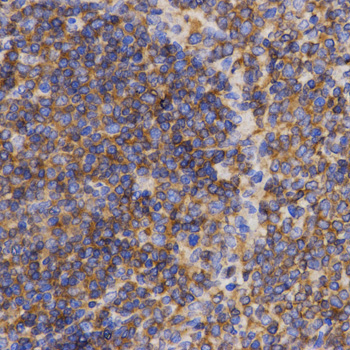Anti-PDCD10 Antibody (CAB2786)
- SKU:
- CAB2786
- Product type:
- Antibody
- Reactivity:
- Human
- Reactivity:
- Rat
- Host Species:
- Rabbit
- Isotype:
- IgG
- Research Area:
- Cardiovascular
Description
| 抗体名: | Anti-PDCD10 Antibody |
| 抗体コード: | CAB2786 |
| 抗体サイズ: | 20uL, 50uL, 100uL |
| 申し込み: | IHC |
| 反応性: | Human, Rat |
| 宿主種: | Rabbit |
| 免疫原: | A synthetic peptide of human PDCD10 |
| 申し込み: | IHC |
| 推奨希釈: | IHC 1:50 - 1:100 |
| 反応性: | Human, Rat |
| ポジティブサンプル: |
| 免疫原: | A synthetic peptide of human PDCD10 |
| 精製方法: | Affinity purification |
| ストレージバッファ: | Store at -20'C. Avoid freeze / thaw cycles. Buffer: PBS with 0.02% sodium azide, 50% glycerol, pH7.3. |
| アイソタイプ: | IgG |
| 順序: | Email for sequence |
| 遺伝子ID: | 11235 |
| Uniprot: | Q9BUL8 |
| セルラーロケーション: | Cell membrane, Cytoplasm, Cytoplasmic side, Golgi apparatus membrane, Peripheral membrane protein |
| 計算された分子量: | 24kDa |
| 観察された分子量: |
| 同義語: | PDCD10, CCM3, TFAR15 |
| バックグラウンド: | This gene encodes an evolutionarily conserved protein associated with cell apoptosis. The protein interacts with the serine/threonine protein kinase MST4 to modulate the extracellular signal-regulated kinase (ERK) pathway. It also interacts with and is phosphoryated by serine/threonine kinase 25, and is thought to function in a signaling pathway essential for vascular developent. Mutations in this gene are one cause of cerebral cavernous malformations, which are vascular malformations that cause seizures and cerebral hemorrhages. Multiple alternatively spliced variants, encoding the same protein, have been identified. |
| UniProt Protein Function: | PDCD10: Promotes cell proliferation. Modulates apoptotic pathways. Increases mitogen-activated protein kinase activity and MST4 activity. Important for cell migration, and for normal structure and assembly of the Golgi complex. Important for KDR/VEGFR2 signaling. Increases the stability of KDR/VEGFR2 and prevents its breakdown. Required for normal cardiovascular development. Required for normal angiogenesis, vasculogenesis and hematopoiesis during embryonic development. Defects in PDCD10 are the cause of cerebral cavernous malformations type 3 (CCM3). Cerebral cavernous malformations (CCMs) are congenital vascular anomalies of the central nervous system that can result in hemorrhagic stroke, seizures, recurrent headaches, and focal neurologic deficits. CCMs have an incidence of 0.1%-0.5% in the general population and usually present clinically during the 3rd to 5th decade of life. The lesions are characterized by grossly enlarged blood vessels consisting of a single layer of endothelium and without any intervening neural tissue, ranging in diameter from a few millimeters to several centimeters. Belongs to the PDCD10 family. |
| UniProt Protein Details: | Protein type:Apoptosis Chromosomal Location of Human Ortholog: 3q26.1 Cellular Component: Golgi membrane; Golgi apparatus; cytoplasm; plasma membrane; cytosol Molecular Function:protein binding; protein homodimerization activity; protein N-terminus binding; protein kinase binding Biological Process: protein stabilization; positive regulation of peptidyl-serine phosphorylation; positive regulation of stress-activated MAPK cascade; positive regulation of MAP kinase activity; response to hydrogen peroxide; establishment of Golgi localization; positive regulation of cell proliferation; stress fiber formation; regulation of Rho protein signal transduction; angiogenesis; positive regulation of Notch signaling pathway; negative regulation of apoptosis; positive regulation of cell migration Disease: Cerebral Cavernous Malformations 3 |
| NCBI Summary: | This gene encodes an evolutionarily conserved protein associated with cell apoptosis. The protein interacts with the serine/threonine protein kinase MST4 to modulate the extracellular signal-regulated kinase (ERK) pathway. It also interacts with and is phosphoryated by serine/threonine kinase 25, and is thought to function in a signaling pathway essential for vascular developent. Mutations in this gene are one cause of cerebral cavernous malformations, which are vascular malformations that cause seizures and cerebral hemorrhages. Multiple alternatively spliced variants, encoding the same protein, have been identified. [provided by RefSeq, Jul 2008] |
| UniProt Code: | Q9BUL8 |
| NCBI GenInfo Identifier: | 74733232 |
| NCBI Gene ID: | 11235 |
| NCBI Accession: | Q9BUL8.1 |
| UniProt Related Accession: | Q9BUL8 |
| Molecular Weight: | |
| NCBI Full Name: | Programmed cell death protein 10 |
| NCBI Synonym Full Names: | programmed cell death 10 |
| NCBI Official Symbol: | PDCD10 |
| NCBI Official Synonym Symbols: | CCM3; TFAR15 |
| NCBI Protein Information: | programmed cell death protein 10 |
| UniProt Protein Name: | Programmed cell death protein 10 |
| UniProt Synonym Protein Names: | Cerebral cavernous malformations 3 protein; TF-1 cell apoptosis-related protein 15 |
| UniProt Gene Name: | PDCD10 |
| UniProt Entry Name: | PDC10_HUMAN |
 | Immunohistochemistry of paraffin-embedded rat spleen using PDCD10 antibody (CAB2786) at dilution of 1:200 (40x lens). |

